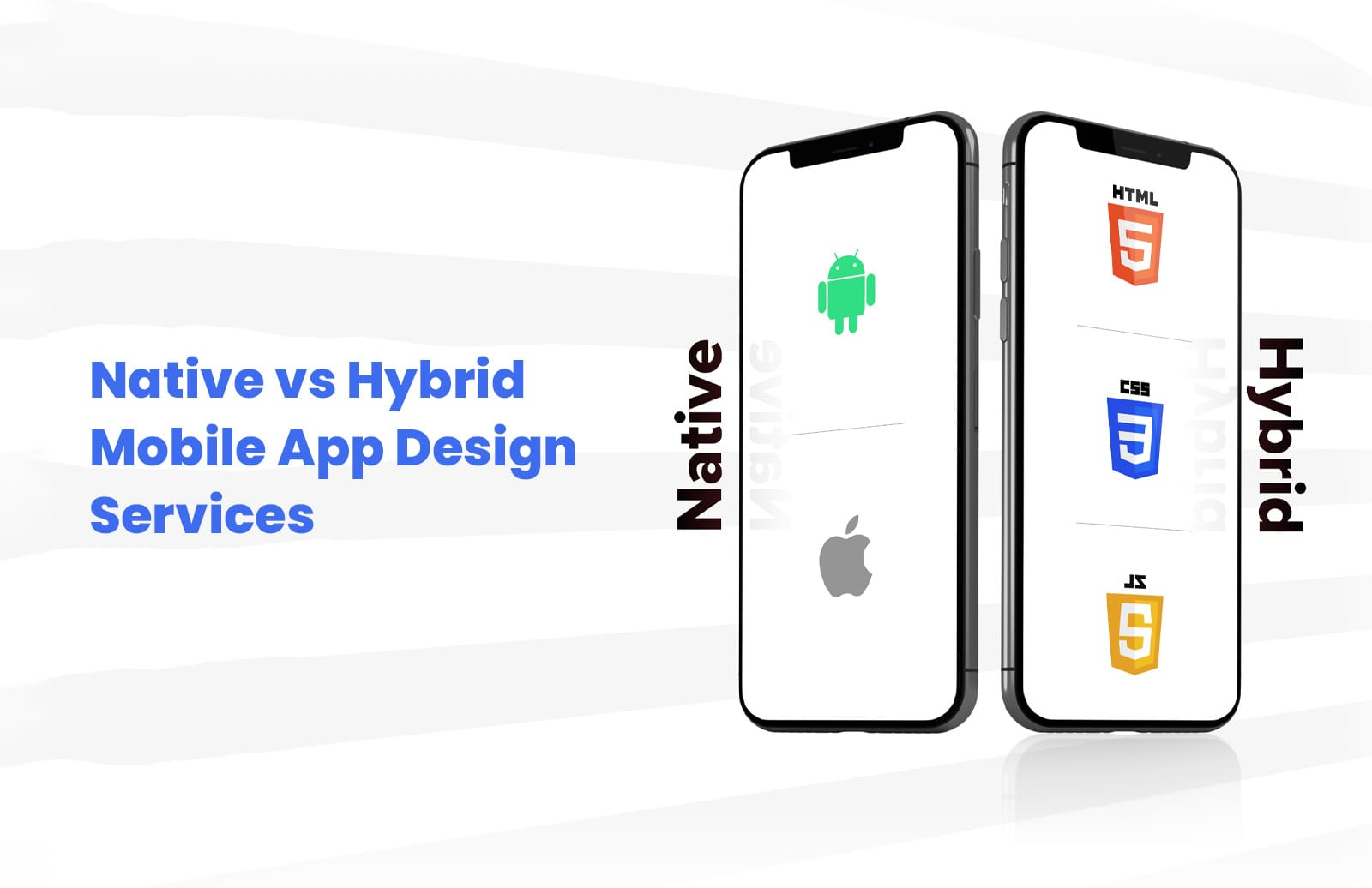Native vs. Hybrid Mobile app design services
Nowadays, businesses depend on mobile apps to promote their products and mobile app design services. A mobile app is very convenient to develop for any business and use for any customer. Apps come in various types with different features and characteristics. The two common types of apps are native and hybrid mobile apps.
While a hybrid app is developed with an extra coding layer, the native mobile app works on a particular mobile operating system. Although both these apps look similar, they are still different. Let us examine the differences between these mobile apps regarding features, benefits, and so on.
Definition of a native app
A native app works on a specific platform, such as Android and iOS. These apps work speedier than other types of apps. With the help of a native app, users can work remotely from their smart devices. Native apps offer a user-friendly experience to mobile users.
Native apps are installed on users' mobile devices. They can very easily access various features such as a microphone, camera, and GPS. Native apps help store the device's data and work seamlessly with other native apps on the same platform.
What are hybrid apps?
Hybrid apps combine the features of a native and web app. They have an extra layer of coding that helps them work on multiple operating systems. Hybrid apps can run on both Android and iOS platforms. They have a native shell mobile app design service that prevents them from leveraging the mobile device's software designers and hardware.
In addition, hybrid apps need only one codebase to work on different platforms, making them cost-effective for software designers to build.
Key differences between Native apps and Hybrid apps
Both Native apps and Hybrid apps have some similar features, but they are different from one another. Let us have a look at the major differences between these apps in terms of various factors:
Performance of the apps
The first characteristic to look for is the app's performance. Native apps perform the best in various tasks, such as gaming and speedy 3D. Hybrid apps, on the other hand, do not perform speedily. They work slower than other types of apps.
Most businesses and companies develop Native apps to perform their various tasks. Hybrid apps are not as popular as native apps because of their low speed and poor performance. In terms of performance, the native apps are better than hybrid apps. They also work faster than hybrid apps.
User experience
Another important feature to look at is user experience. UX design is one of the most crucial things in any mobile app. Users want a better user experience on their devices. Native apps work on a particular operating system, whereas hybrid apps follow an approach with a single codebase and UI. Building a hybrid app is easy and speedy. These apps have common UI and UX designs for all platforms. A native app is a winner in terms of user experience.
App update
Now, let us talk about the app update factor. In native apps, users must update to the latest version to use the app in the app store. On the other hand, hybrid apps do not need to be updated to use all the features. As these apps are web apps, they do not need any updates. In this case, hybrid apps win over native apps. Hybrid apps work without any extra cost of updates or maintenance, and you can use them for a long time without any updates.
Technology stack
The next factor to look for is the technology stack. The right technology stack is necessary for app performance to be better. It also improves the development process of the mobile app. While developing a native app, the developers mainly use Kotlin or Java for testing and code editing. They also use Objective-C or Swift programming languages to develop native iOS apps.
The hybrid app leverages standard technologies such as JavaScript and CSS. It works well with backend and native shell components. Some well-known frameworks for developing a hybrid app include Sencha Touch 2 and Cordova. Native apps include basic tools such as Kotlin or Java.
Coding procedure
The process of coding is very important in the development of any app. Native apps can be developed with the help of separate code for the various platforms. They also use different languages for the various native apps. Hybrid apps can be developed with a single code. Developers share the same code on different platforms while developing a hybrid app.
In terms of coding procedure, the hybrid apps win over native apps. The development of a hybrid app does not need multiple codes and saves time for the developers as well. Developers will also get better productivity by developing a hybrid app.
Time for marketing and launching apps
Another important factor to consider is the time to market the apps. Developing a native app takes a lot of time as it needs different codebases. After completing the code procedure, the developers will develop the user interface for the various platforms. Hybrid apps can be developed with the help of a single codebase.
They have a uniform design and codebase to share on multiple platforms. In terms of time management, hybrid apps are better than native apps. They take less time to develop, so developers can easily market hybrid apps within a short time.
App maintenance
Native apps require a higher level of maintenance than hybrid apps. They are costly to maintain for the business and require separate upkeep costs. However, native apps offer a better user experience than hybrid apps. Contrary to that, the hybrid app works on a single codebase and shares only one code. It is easier to maintain a hybrid app than a native app because of a single codebase.
However, the hybrid app faces compatibility issues on various devices and OS platforms. While selecting the app, it is necessary to consider factors like long-term goals and project complexity. If you want perfect maintenance, go for a hybrid app. On the other hand, if you want several customization options, pick a native app.
Cost of development
Developing a native app is more expensive than developing a hybrid app. A native app requires the help of a professional app developer, while a hybrid app does not. A web app development team can easily develop a hybrid app with the help of available resources. Developing a hybrid mobile app with the available funds and resources is very affordable. A hybrid app is more cost-effective than a native app because it requires a single codebase.
Conclusion
These are the major differences between a native app and a hybrid app. Both apps have benefits and drawbacks. Choosing a particular app for your business depends on various factors. You can hire an expert in app development to suggest the right app for your business. You can also hire a mobile app design agency from online sources or social media sites.
When choosing an app, you must consider your business type, size, requirements, and budget. These factors will help you choose the right mobile app design agency for your business's development.









